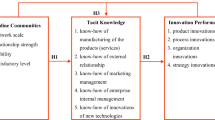Abstract
Under the platform economy, more and more enterprises attract users to participate in innovation by means of Open Innovation Communities (OIC) and improve organizational performance through knowledge sharing. How to evaluate the efficiency of knowledge sharing scientifically is of great significance. In this paper, a total of 61 “circles” datum of the **aomi community were acquired as examples and divided into categories, and they were evaluated the knowledge sharing efficiency using the three-stage DEA model. The results showed that environmental factors and random interference had a strong impact on the efficiency of knowledge sharing in the community of enterprises. The comprehensive technical efficiency of 91.67% of the “circles” decreased significantly after adjustment, mainly due to low scale efficiency. The number of users featured posts, the number of fans, employee participation and the percentage of authenticated users had a positive impact on the efficiency of knowledge sharing in the community, and the number of user posts and community size had a negative impact on the efficiency of the community knowledge sharing. Finally, it discussed countermeasures and suggestions to improve the efficiency of knowledge sharing in the enterprise-hosted community from three aspects: community scale, community incentive system, and personalized service.
Access this chapter
Tax calculation will be finalised at checkout
Purchases are for personal use only
Similar content being viewed by others
References
Felin, T., Zenger, T.R.: Closed or open innovation? problem solving and the governance choice. Res. Policy 43(5), 914–925 (2014)
Debaere, S., Coussement, K., De Ruyck, T.: Multi-label classification of member participation in online innovation communities. Eur. J. Oper. Res. 270(2), 761–774 (2018)
Zhang, H., Ren, L., Liu, W., Zhou, H.: Study on user knowledge collaborative innovation based on super-network——example of open innovation community “Pollen Club.” J. China Soc. Sci. Tech. Inf. 04, 402–413 (2021). (in Chinese)
Nambisan, S., Wright, M., Feldman, M.: The digital transformation of innovation and entrepreneurship: progress, challenges and key themes. Res. Policy 48(8), 103773 (2019)
Yang, L., Wang, Z., Hou, G.: Research on influence factors of knowledge sharing behavior of online user innovation communities. New Century Library (02), 55–59+86 (2020). (in Chinese)
Jiang, Y., Liao, J., Chen, J., Hu, Y., Du, P.: Motivation for users’ knowledge-sharing behavior in virtual brand communities: a psychological ownership perspective. Asia Pac. J. Mark. Logist. 34(10), 2165–2183 (2022)
Rajabion, L., Nazari, N., Bandarchi, M., Farashiani, A., Haddad, S.: Knowledge sharing mechanisms in virtual communities: a review of the current literature and recommendations for future research. Hum. Syst. Manag. 38(4), 365–384 (2019)
Wang, N., Yin, J., Ma, Z., Liao, M.: The influence mechanism of rewards on knowledge sharing behaviors in virtual communities. J. Knowl. Manag. 26(3), 485–505 (2021)
Li, C., Huang, H., Zhang, F.: Knowledge sharing behavior incentive mechanism for lead users based on evolutionary game. J. Comput. Appl. 41(6), 1785–1791 (2021). (in Chinese)
Lee, S., Hong, J.: Analyzing the change in knowledge sharing efficiency of knowledge networks: a case study. Inf. Technol. Manage. 20(1), 41–53 (2018). https://doi.org/10.1007/s10799-018-0292-5
Zhang, K.: Research on Knowledge Sharing in Open Innovation Community. Jilin University, Jilin, China, Doctor (2017). (in Chinese)
Yuan, Y., Zhang, Y., Ma, R., Wang, Y., He, P., Yu, Q.: Knowledge exchange efficiency of online health community based on SBM-TOBIT model. Inf. Sci. 05, 106–114 (2021). (in Chinese)
Charnes, A., Cooper, W.W., Rhodes, E.: Measuring the efficiency of decision making units. Eur. J. Oper. Res. 2(6), 429–444 (1978)
Charnes, A., Cooper, W.W.: Preface to topics in data envelopment analysis. Ann. Oper. Res. 2(1), 59–94 (1984)
Ren, L.: Influencing factors and development approaches of knowledge sharing in online open innovation community. Inf. Sci. 09, 48–53 (2019). (in Chinese)
Yang, R., Huang, S., Wang, Y.: Research on evaluation efficiency of knowledge exchange in online healthy community based on three-stage DEA model. Inf. Stud. Theory Appl. 10, 122–129 (2020). (in Chinese)
Simar, L., Wilson, P.W.: Estimation and inference in two-stage, semi-parametric models of production processes. J. Econ. 136(1), 31–64 (2007)
Zhao, K., Stylianou, A.C., Zheng, Y.: Predicting users’ continuance intention in virtual communities: the dual intention-formation processes. Decis. Support Syst. 55(4), 903–910 (2013)
**e, R., Zhang, W.: An empirical study on the impact of platform environmental factors on knowledge sharing in virtual communities. Technol. Soc. 71, 102094 (2022)
Liu, W.: Technological innovation efficiency of high-tech industries considering environmental factor in China—Comparison of two periods from 2000–2007 and from 2008–2014. Sci. Res. Manag. 11, 18–25 (2016). (in Chinese)
Acknowledgement
This research was supported by the National Social Science Foundation of China under Grant 17BGL028.
Author information
Authors and Affiliations
Corresponding author
Editor information
Editors and Affiliations
Rights and permissions
Copyright information
© 2023 The Author(s), under exclusive license to Springer Nature Switzerland AG
About this paper
Cite this paper
Tian, J., Gao, X. (2023). Research on Knowledge Sharing Efficiency Evaluation of Open Innovation Community: A Case of **aomi Community. In: Tu, Y., Chi, M. (eds) E-Business. Digital Empowerment for an Intelligent Future. WHICEB 2023. Lecture Notes in Business Information Processing, vol 480. Springer, Cham. https://doi.org/10.1007/978-3-031-32299-0_2
Download citation
DOI: https://doi.org/10.1007/978-3-031-32299-0_2
Published:
Publisher Name: Springer, Cham
Print ISBN: 978-3-031-32298-3
Online ISBN: 978-3-031-32299-0
eBook Packages: Computer ScienceComputer Science (R0)




